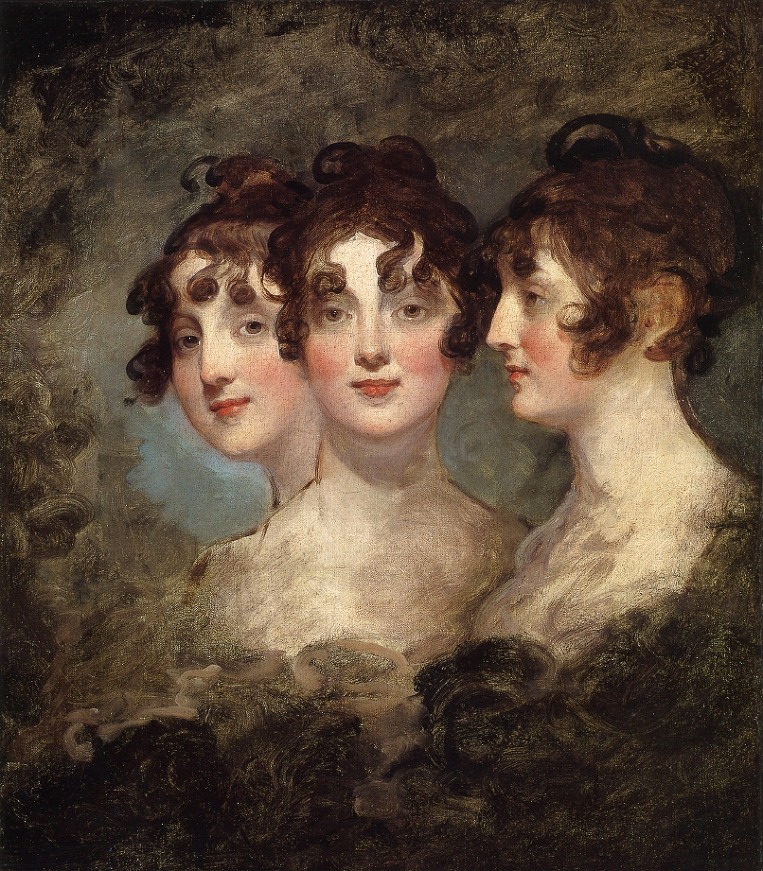 Elizabeth (Betsy) Patterson, shown above in three views by Gilbert Stuart, was the daughter of a wealthy Baltimore businessman. In 1803 when Jerome Bonaparte, the youngest brother of Napoleon, came to the United States, he met Betsy at a ball, and despite her father's apprehensions, they were married before the end of the year by Archbishop Carroll of Baltimore.
Elizabeth (Betsy) Patterson, shown above in three views by Gilbert Stuart, was the daughter of a wealthy Baltimore businessman. In 1803 when Jerome Bonaparte, the youngest brother of Napoleon, came to the United States, he met Betsy at a ball, and despite her father's apprehensions, they were married before the end of the year by Archbishop Carroll of Baltimore. Jerome already had celebrity status in America just by being a Bonaparte, and his beautiful bride enhanced his luster. Betsy would cultivate a celebrity of her own by wearing fashions so diaphanous they hardly hid her nakedness. (For more information about the styles of the day, see "Women's Fashions, 1800. Part 1.")
Napoleon, who had dynastic alliances planned for his relatives, was not amused by his brother's activities in America. The couple however was enjoying a honeymoon, touring a number of American cities before setting sail for France to plead with Napoleon to accept their marriage. On April 21, 1804, they rolled into Philadelphia, where they stayed for a few days across the street from the Gratz house.
A measure of the excitement they stirred: even the cool Rebecca Gratz went to the window to view their arrival. Solomon Moses, who was visiting the Gratz's, had no compunctions about gawking at the open front door. But while Rebecca was curious, she was not envious. Thinking of Mrs. Bonaparte, she wrote, "Last year she could go anywhere unnoted."
If you try to name famous women of antebellum America, you will discover not celebrated women but controversial ones: Lucretia Mott, the abolitionist; Elizabeth Cady Stanton and Susan B. Anthony, feminists; Margaret Fuller, a Transcendentalist and intellectual, and of course Harriet Beecher Stowe. Only Dolley Madison achieved in the course of her long life general approbation. It is no wonder that the idea of celebrity held no allure for Rebecca.
After her initial look, Rebecca decided the Bonaparte's would just be a nuisance. She expected that "loungers" would soon appear in the street and on the sidewalks. She also noted that it was likely that the Gratz's would receive an unusual number of visitors as long as the couple was in the vicinity.
Jerome and Betsy Bonaparte sailed for France a short while after their stay in Philadelphia, but only Jerome was permitted to go ashore. Betsy went to England to give birth to a son and await her husband's return. She never saw him again. When Napoleon could not bully the Pope into annulling the marriage, he annulled it himself and married Jerome off to a German princess.
Betsy Bonaparte returned to America with her child and eventually was granted a divorce by the Maryland legislature. After the fall of Napoleon, she tried to interest the Bonapartes in granting her and her son financial support but failed completely. As an heiress herself, Betsy was not looking for money so much as recognition of her son's legitimate place in the Bonaparte family. Betsy never remarried, resumed her role in America's high society and showed that she could take care of herself: she invested her inheritance wisely, lived into her 90's and died a millionairess.
(Rebecca's letter to her sister Rachel is in the Gratz Family Collection, Manuscript Collection No. 72, at the American Philosophical Society.)
No comments:
Post a Comment